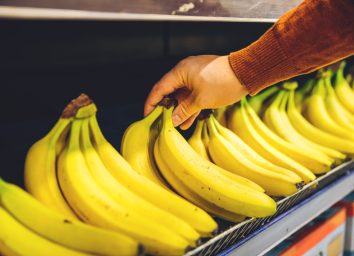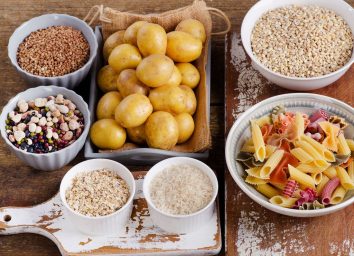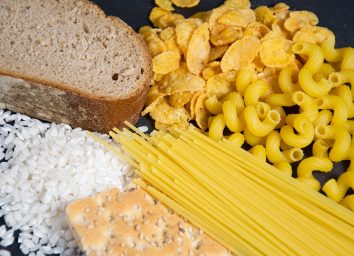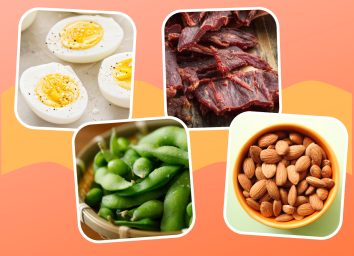The 9 Best Complex Carbs for Weight Loss
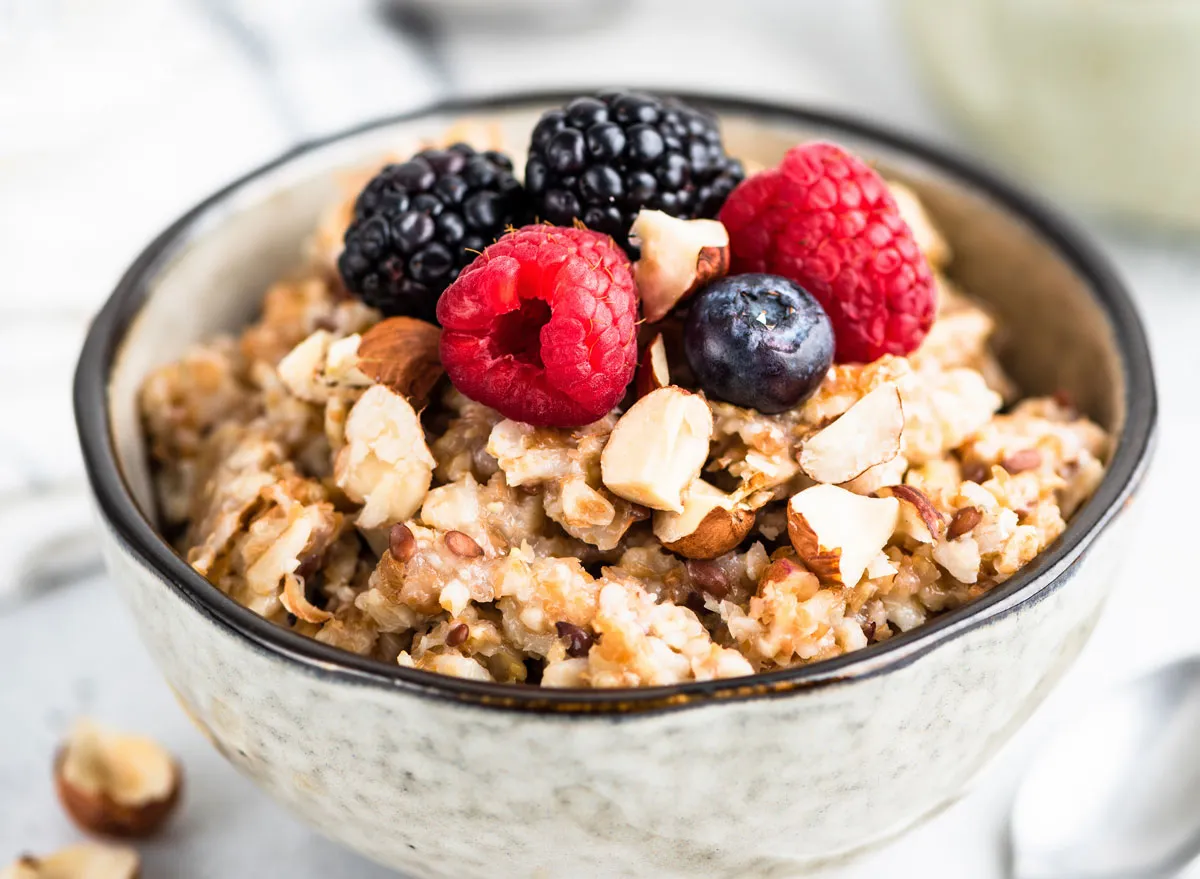
If you’re looking to shed unwanted weight fast, there are more efficient ways to whittle your middle than giving up your morning toast or occasional pasta dinner. Yes, it’s true: You can lose weight eating carbs, but only if you eat the right ones. And by right ones, we mean complex carbs.
The key to hacking your weight-loss plan is limiting your intake of simple carbohydrates and nourishing your body with complex carbohydrates.
What are complex carbs?
Before we get into what complex and simple carbs are, let’s start with the basics: carbohydrates.
Carbohydrates are a type of macronutrient, just like protein or fat. Carbs are the main energy source of the human diet, according to an American Journal of Clinical Nutrition article. As you’ll notice on a nutrition label, “Total Carbohydrate” accounts for carbohydrates that can be sorted into three groups.
These three types of carbs in our diets are as follows:
- Complex carbs (starches)
- Simple carbs (sugars)
- Dietary Fiber
Complex carbs, or starches, are made up of long chains of sugar molecules that your body then breaks down for energy. These carbohydrates keep you full for longer because they take more time for your body to digest. While complex carbs are often less refined than their sugar counterparts, that doesn’t mean sources of complex carbs are not processed at all (for example, whole grain bread).
Examples of complex carbs include:
- Whole grain foods like quinoa, barley, brown rice, and oats
- Whole-grain, processed products like bread, pasta, cereal, and crackers
- Legumes like lentils, chickpeas, kidney beans, green peas, and split peas
- Other starchy vegetables like potatoes, sweet potatoes, and corn
Simple carbs are basically sugars, or are sometimes referred to as “fast-acting carbs.” They’re found mainly in fruits and vegetables, but also in refined (processed) grains, cakes, and other baked goods. Simple and refined, they burn up fast, spiking your blood sugar and causing it to crash, leaving you with a craving for—more carbs!
Dietary fiber is an indigestible long chain of sugar molecules. Fiber is found in the same foods that contain complex carbs, such as fruits, veggies, grains, and legumes.
What makes complex carbs healthier than simple carbs?
You’ll want to swap out simple carbs for their complex counterparts for multiple reasons.
- Quick-burning, highly-refined simple carbs don’t usually contain the plethora of health-promoting vitamins and minerals that complex carbs do.
- Complex carbs take longer for your body to break down, which means you’ll spend more energy to burn these than simple sugars.
Below, discover the world of benefits our best complex carbs provide. They’re the best of the best when it comes to healthy carbs. Stock up on these picks below to get lean and stay healthy.
Quinoa
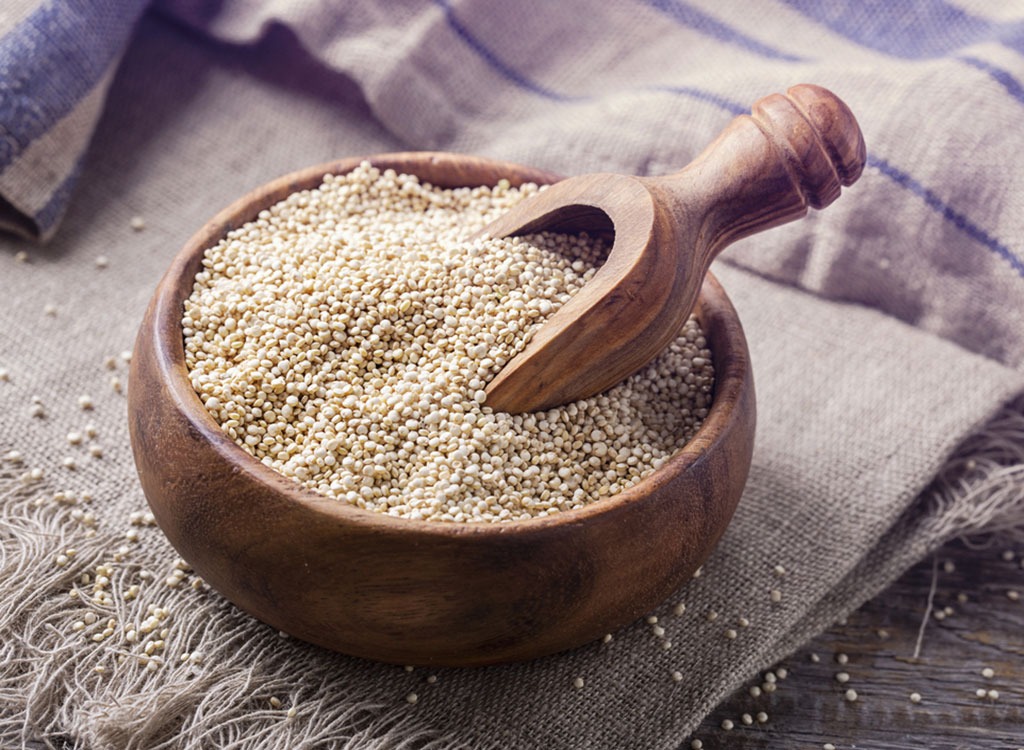
It has a light, mild flavor, making it ideal for people who dislike other “cardboard-y” whole grains. It gets better: quinoa is higher in protein than any other grain—with 6 grams per half-cup—and packs a hefty dose of heart-healthy, unsaturated fats. “Quinoa is also a great source of fiber and B vitamins,” says Christopher Mohr, PhD, RD, a professor of nutrition at the University of Louisville.
While this pseudocereal is a great source of vegetarian protein, serving up 8 grams of protein per cooked cup, quinoa is still a carb, as it contains 39 grams of carbs per cup serving—5 grams of which are fiber and 1.5 grams are sugar.
Try Quinoa in the morning! It has twice the protein of most cereals, and fewer carbs. Boil 1 cup quinoa in 2 cups of water. Let cool. In a large bowl, toss it with 2 diced apples, 1 cup fresh blueberries, 1/2 cup chopped walnuts and 1 cup plain fat-free yogurt. This recipe serves four, so stash any leftovers in the fridge for easy breakfasts throughout the week. And if you’re having a hard time doing anything interesting with this tricky grain, try these easy and filling 20 Delicious Quinoa Bowls for Breakfast.
Black Beans
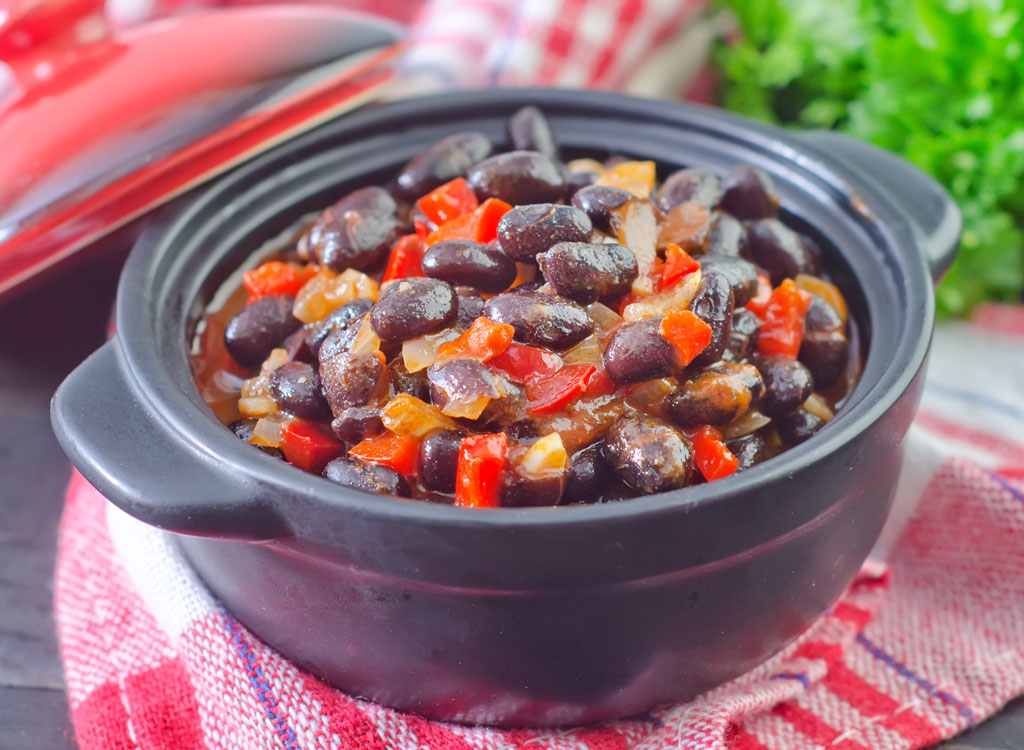
Next time you bust out the slow cooker to make homemade beef chili, don’t forget to add some black beans to the mix. Out of all beans, this dark legume has the highest amount of the antioxidant anthocyanin, which forms a strong defense against cardiovascular disease. A daily half-cup serving of canned beans provides 7 grams of protein and 8.5 grams of fiber, according to the USDA National Nutrient Database. We also like peas, lentils, and pinto, kidney, fava, and lima beans.
Buy a brand that’s low-sodium or salt-free—like Eden Foods—or make them fresh. And here’s a recipe we love for Black Bean and Tomato Salsa: Dice 4 tomatoes, 1 onion, 3 cloves garlic, 2 jalapeños, 1 yellow bell pepper and 1 mango. Mix in a can of black beans and garnish with 1/2 cup chopped cilantro and the juice of 2 limes.
100% Whole Grain Bread
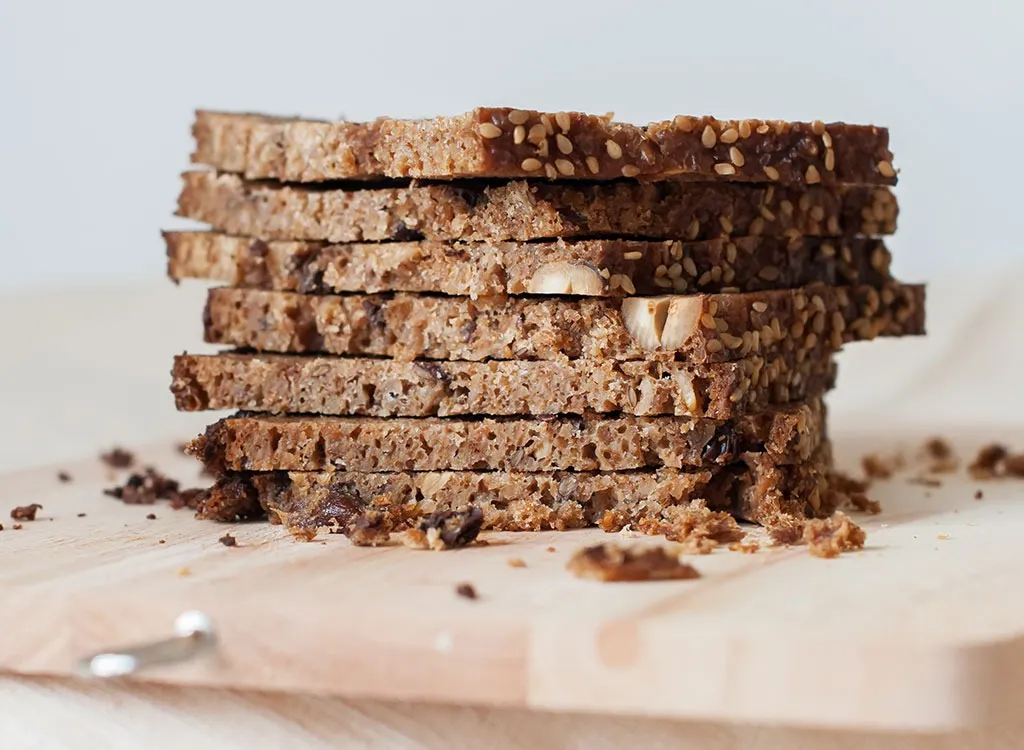
With whole-wheat bread, you’re getting all three parts of the grain: the bran, germ, and endosperm. Refined grains lack the bran and germ, which the Whole Grains Council says contain 25 percent of a grain’s protein. You’ll want to be careful picking out a loaf in the grocery store, as many breads are filled with high fructose corn syrup or a blend of whole and white wheats. Make sure your bag says “100% Whole Wheat” and know that it’s worth splurging on the pricier stuff. For more tips, check out 20 Best & Worst Store-Bought Breads.
We like Ezekiel 4:9 Sprouted Cinnamon Raisin Bread. The millet, spelt and cholesterol-lowering barley in this slightly-sweet loaf help boost its fiber, a nutrient that wards off hunger while keeping calories low. Toast up a slice and smear it with some natural peanut butter for a quick, nutrient-packed breakfast that both big and little kids alike are sure to love.
Oatmeal
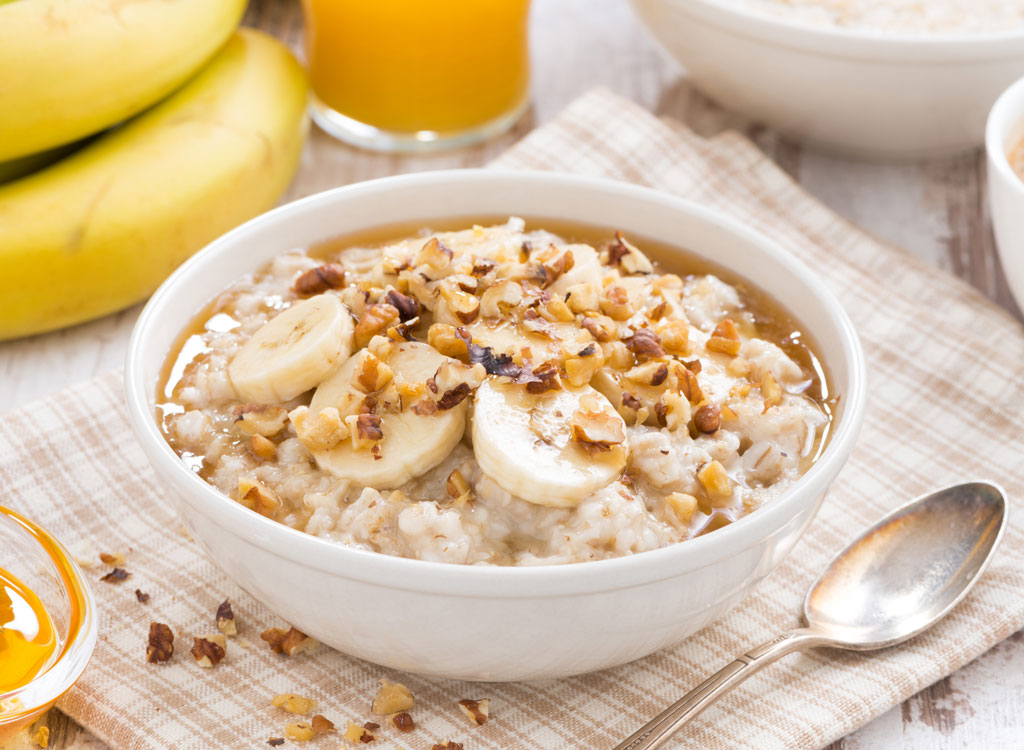
“Oatmeal is a great source of complex carbs that fuels the body [with energy] and [is packed with] fiber to decrease the risk of heart disease,” shares Jim White, RD, ACSM, HFS, Owner of Jim White Fitness and Nutrition Studios. Start your day with a warm and comforting bowl of steel-cut oats. These crunchy grains are your best bet when choosing which a.m. staple to spoon because they’re less processed than quick-cook oats and therefore retain more fiber and protein. Specifically, oats contain 5 grams of protein and 4 grams of fiber per half-cup serving. This essential macronutrient combo will help crush cravings and keep hunger pangs at bay—especially since the specific soluble fiber found in oats, known as beta-glucans, has been shown to enhance feelings of satiety.
Top your oats with omega-3-rich chia seeds and antioxidant-rife cacao nibs to add healthy fats and round out your morning meal. If you find yourself in a time crunch or even just want to keep a healthy snack stashed in your desk drawer, check out our round-up of the best and worst instant oatmeals for weight loss.
Whole-Wheat Pasta
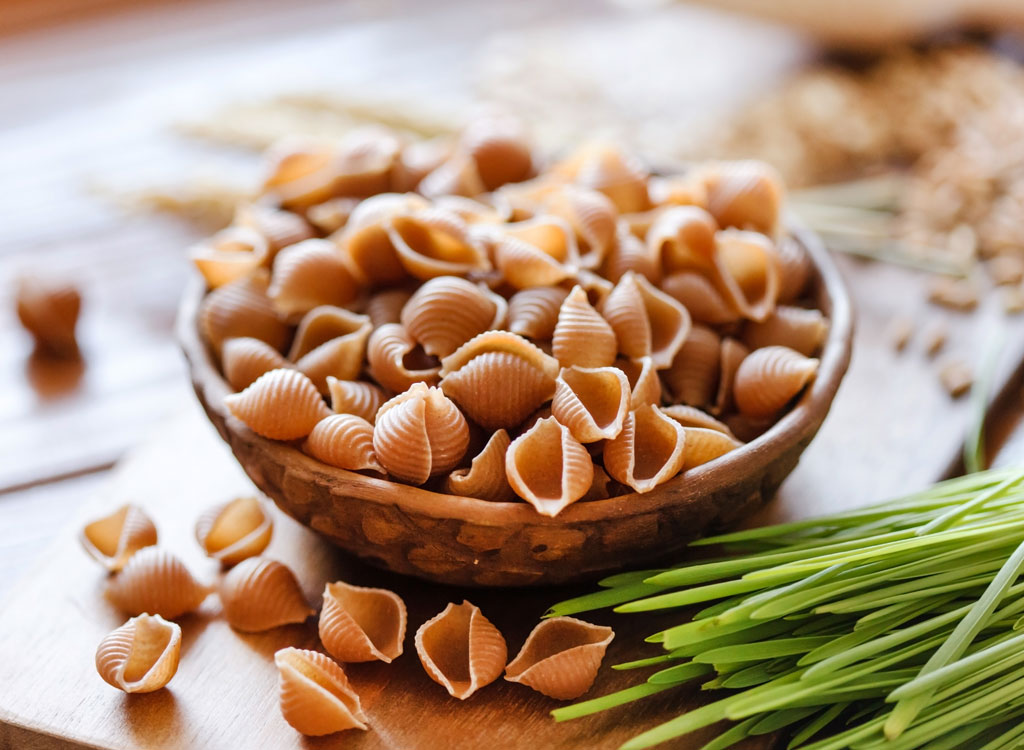
Regular pasta is made with white wheat flour, which has been stripped of the grain’s nutrient-dense bran and germ, which are brimming with fiber, protein, and vitamins and minerals. Go for whole-wheat or whole-grain pasta to reap some satiating benefits. Here’s another waist-whittling trick: After cooking your penne, pop it into the fridge and then dig in when it’s cold. Cooling the noodle turns its starch into resistant starch, which digests more slowly, discouraging you from spooning into a second helping.
Jovial Einkorn Rigatoni is our go-to brand for whole wheat pasta. (Also try varieties made with chickpeas, black beans, quinoa, or lentils, like Modern Table’s Lentil Rotini.) Because it has never been hybridized, Einkorn is one of the purest species of wheat out there, say its proponents. The whole grain is rich in protein and fiber, and just one serving of this pasta dishes up a quarter of the day’s phosphorus (a nutrient that’s typically only found in milk and meat) and 80 percent of the day’s manganese, an essential nutrient that helps the body process cholesterol, carbs and proteins.
And, bonus health tip: If you’re whipping up a pasta sauce, try throwing some flax seeds in the mix, suggests Rachel Fine, MS, RD, CDN. “They’re a great source of healthy unsaturated fats, which are powerhouses for the body’s immune system,” she says. See, because our bodies are exposed to pollutants in the environment, they’re in a constant state of low-severity inflammation. Thanks to their unsaturated fat content, flax seeds help the body battle that inflammation, according to Fine.
Green Peas
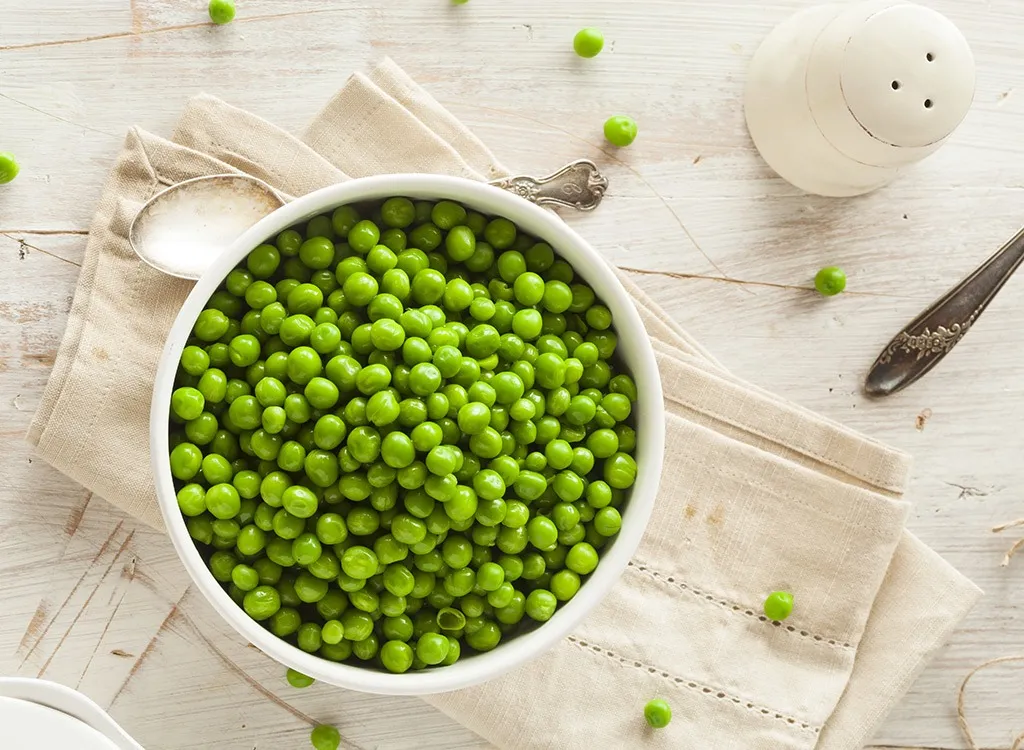
Beyond the abundance of vitamins and minerals, a cup of peas contains more than a third of your kid’s daily fiber intake—more than most whole-wheat breads. In one four-week Spanish study, researchers found that eating a calorie-restricted diet that includes four weekly servings of legumes aids weight loss more effectively than an equivalent diet that doesn’t include them. Those who consumed the legume-rich diet also saw improvements in their “bad” LDL cholesterol levels and systolic blood pressure. To reap the benefits at home, work lentils, chickpeas, peas and beans into your diet throughout the week.
Add frozen peas to a pasta sauce at the last second, or puree them up with garlic and olive oil as a simple, sweet dip. Or: “A handful of Snapea Crisps provides a whopping five grams of satiety-boosting protein and four grams of fiber for a mere 110 calories,” says Lisa De Fazio, MS, RD, Los Angeles-based Registered Dietitian. “Plus, this snack is non-perishable, so it can be easily eaten just about anywhere.”
Acorn Squash
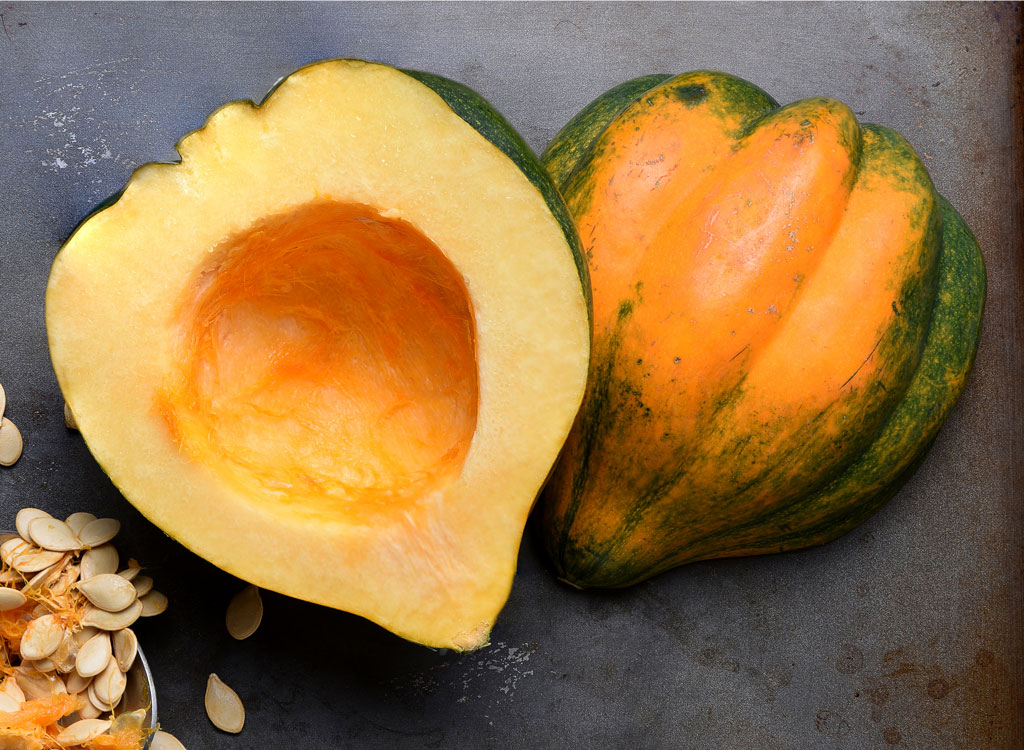
Drizzle acorn squash with heart-healthy olive oil before baking for a wholesome dinner side that’s sure to please. The orange-fleshed veggie is jam-packed with blood-sugar-regulating soluble fiber, diabetes-preventing magnesium, and 30 percent of your daily vitamin C needs. The body uses this nutrient to form muscle and blood vessels, and Arizona State University researchers claim it can even boost the fat-burning effects of exercise.
For a simple—yet sweet—side dish, halve an acorn squash, scoop out the seeds and add a little butter, cinnamon and a drizzle of maple syrup. Bake for about an hour at 400 degrees F. Or try this delicious Avocado and Quinoa Stuffed Acorn Squash.
Barley
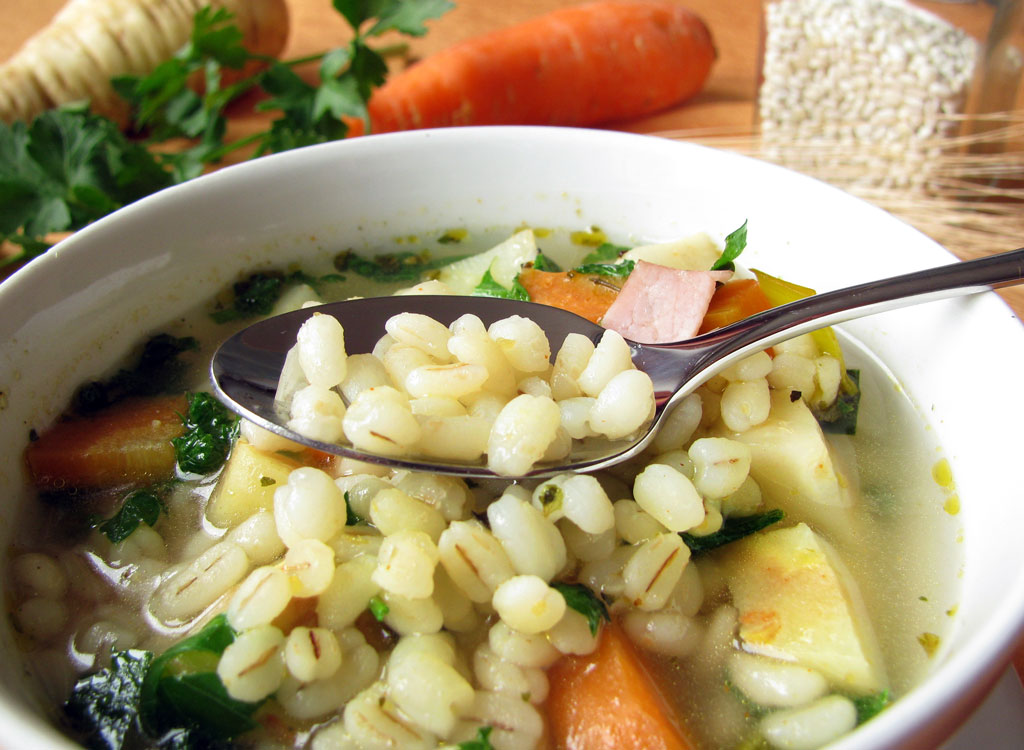
Give regular ol’ wheat a break from your weekly lunch rotation and switch it up with barley. The high-fiber whole-grain is loaded with essential vitamins and minerals such as mood-boosting B vitamins, immunity-protecting selenium, and bone-building manganese. What’s more, a study published in the Journal of the American College of Nutrition found that barley helped participants lower their weight, cholesterol levels, and reduced feelings of hunger.
Try barley by buying Kashi 7 Whole Grain Nuggets Cereal. Cereals rich in fiber and whole grains reduce the risk of disease and early death, say Harvard School of Public Health researchers. Lucky for you, these nuggets are made with fiber-rich whole grains like oats, red wheat, rye, brown rice, triticale, barley, buckwheat, and sesame seeds.
Kamut
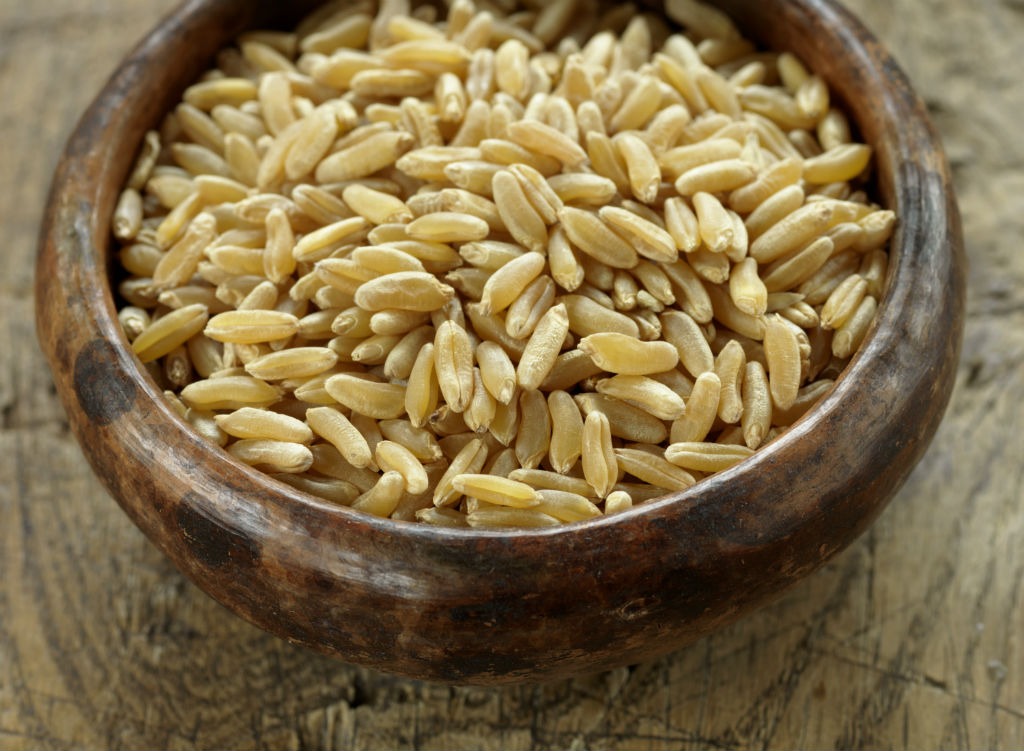
Kamut, or Khorasan wheat, is an ancient grain that’s brimming with nearly 10 grams of protein and about 7 grams of fiber per cooked cup. Plus, the buttery-flavored grain contains high levels of inflammation-fighting cytokines, according to a study published in the European Journal of Clinical Nutrition, which can help ward off weight gain. For more foods that’ll help you banish belly fat and bloat, check out these anti-inflammatory foods.
Buy it and boil it. Or try Eden Foods Kamut Spaghetti. In addition to serving up a good amount of protein and fiber, the noodles have 20 percent of the day’s magnesium—a nutrient not normally found in pasta. Not getting enough magnesium has been linked to insulin resistance, metabolic syndrome, and coronary heart disease.
